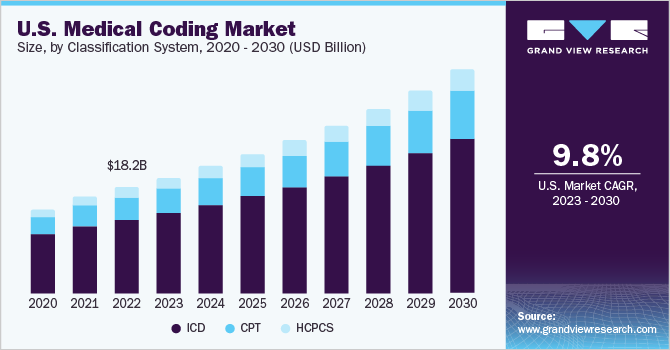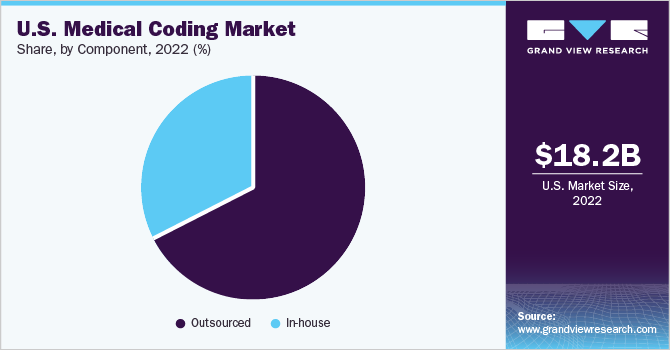- Home
- »
- Healthcare IT
- »
-
U.S. Medical Coding Market Size And Share Report, 2030GVR Report cover
![U.S. Medical Coding Market Size, Share & Trends Report]()
U.S. Medical Coding Market Size, Share & Trends Analysis Report By Classification System (ICD, HCPCS, CPT), By Component, By Medical Specialty, And Segment Forecasts, 2023 - 2030
- Report ID: GVR-3-68038-025-5
- Number of Report Pages: 150
- Format: PDF, Horizon Databook
- Historical Range: 2018 - 2021
- Forecast Period: 2023 - 2030
- Industry: Healthcare
Market Size & Trends
The U.S. medical coding market size was valued at USD 18.2 billion in 2022 and is expected to grow at a compound annual growth rate (CAGR) of 9.85% from 2023 to 2030. Errors in billings, insurance fraud, and misinterpretations of medical documents result in large financial losses. Increasing losses due to ineffective medical billing and revenue cycle management is increasing demand for revenue cycle management including medical coding software and services. This in turn is estimated to drive the market growth potential. High adoption of digital technologies such as electronic health records, revenue cycle management software, mhealth applications, telehealth, and increasing efforts towards digitalization of healthcare in the U.S. is positively driving the market growth. In 2021, about 88.2% of the physicians offices were using electronic health records in the U.S., as per the data provided by the Centers for Disease Control and Prevention.

There is increasing utilization of medical coding in the revenue cycle management process.
New revisions are included in the codes to increase flexibility and scalability. New ICD 11 was implemented in January 2022. It has several new chapters and supports electronic health records. It has approximately 55 thousand codes for the classification of disorders, diseases, injuries, and deaths. Moreover, many new codes were created during the COVID-19 pandemic for COVID 19 and telehealth. World Health Organization introduced new ICD 10 codes which came into effect between April and September 2020. Thus, the introduction and revisions of codes is positively impacting the market growth.
The Bureau of Labor Bureau of Labor Statistics, Office of Occupational Statistics and Employment Projections, estimated that medical records and health information employees are estimated to grow by 7% between 2021 and 2031. Certified medical coders are one of the major sought-after jobs in the U.S. The increasing demand for universal language in medical documentation is positively impacting the demand for medical coders and the coding industry.
The increasing workload on healthcare staff and physicians for medical coding are increasing the adoption of various automation solutions. For instance, according to a survey conducted by Athenahealth, physicians are working overtime for an average of 90 minutes for coding. There is an increase in the adoption of computer-assisted coding solutions for rapid, accurate, and efficient medical coding. Computer-assisted coding can increase productivity by 11-30%, as per a survey conducted by 3M. Furthermore, the development of AI-enabled medical coding is estimated to drive market growth.
Healthcare spending in the U.S. is rapidly growing. Moreover, hospital administration costs are the highest in the U.S. Healthcare organizations are facing increasing pressure to provide quality care at reduced costs. Thus, healthcare providers are adopting medical coding software and outsourcing services to reduce administration costs and increase return on investment. This in turn is estimated to drive the market growth.
Classification System Insights
ICD held the highest revenue share of 69.4% in the market in 2022 owing to the growing use of ICD codes by coders. ICD 11 which was effective from 1st January 2022 is accurate and flexible. It allows health information to be utilized for multiple applications such as enhancement in patient outcomes; quality analysis; safety; integrated care; strategic planning; population health reporting; and delivery of health care services. The ICD 11 codes are easy to use. It allows the embedding of the coding tool into local digital records and information technology systems. This results in an increase in user compliance, as well as lowered cost & time for training. Multiple ICD codes and multiple revisions to suit the rapidly evolving health industry is driving the segment growth.
CPT is estimated to be the fastest-growing segment during the forecast period. CPT codes are a part of HCPCS codes. They are used for describing tests, surgery, and other procedures. They are used for medical billing. The government tracks the CPT codes for assessing disease prevalence and health spending. HCPS codes are used by Medicaid, Medicare, and third-party insurers. Usage of HCPCS codes is mandatory under the Health Insurance Portability and Accountability Act (HIPAA) in the U.S. This in turn is driving its adoption.
Medical Specialty Insights
The others segment accounted for over 49.6% of the market revenue share in 2022. This growth can be attributed to increasing insurance coverage for various disease areas, which is resulting in high demand for medical coding services in majority of specialties.
However, the cardiology segment is expected to witness lucrative growth over the forecast period. Cardiology-related costly treatment procedures require medical coding services, as it improves the effectiveness of these procedures and helps manage medical billing, patient care, & other workflows, particularly when patients are among largest group of payers. With rising prevalence of cardiological diseases, workload on payers and hospital staff increased, which is propelling the segment growth.
Component Insights
The outsourced segment accounted for the highest revenue share of 68.4% in 2022 and is estimated to be the fastest-growing segment during the forecast period. Healthcare providers are increasingly outsourcing their medical coding requirements to reduce administrative costs. Outsourcing helps in cost reduction, saves time, and streamlines workflow. Thus, healthcare providers can focus on quality patient care and patient engagement. Rising in offshoring and onshoring of revenue cycle management along with medical coding are positively impacting the market growth. India and the Philippines are the major countries for offshoring due to the easy presence of a skilled workforce at competitive pricing.

The in-house segment is estimated to have a steady growth during the forecast period. Through in-house medical billing, coding, and revenue cycle management, healthcare providers can retain control over the entire operations. Moreover, in case of errors, in-house coders are easily accessible. However, the high cost associated with in-house coding owing to the requirement of skilled coders, software, and infrastructure is increasing the adoption of outsourcing. The outsourcing component is the fastest-growing segment owing to its advantages such as reduction in operating costs, claim denials, and increased scalability.
Key Companies & Market Share Insights
Key stakeholders in the U.S. medical coding industry are introducing new products and services to increase their presence in the U.S. For instance, in January 2023, AQuity launched QCode AI Autonomous Coding solution further expanding the company’s portfolio of coding solutions. Alternatively, in August 2021 GeBBS Healthcare Solutions, Inc. acquired Aviacode, Inc. The acquisition will help the company expand its global footprint and diversify its product portfolio. Some of the prominent players in the U.S. medical coding market include:
-
STARTEK
-
Oracle
-
Maxim Healthcare Services
-
Parexel International Corporation
-
Aviacode Inc.
-
Verisk Analytics, Inc.
-
Medical Record Associates, LLC.
U.S. Medical Coding Market Report Scope
Report Attribute
Details
Market size value in 2023
USD 20.0 billion
Revenue forecast in 2030
USD 38.6 billion
Growth rate
CAGR of 9.85% from 2023 to 2030
Base year for estimation
2022
Historical data
2018 - 2021
Forecast period
2023 - 2030
Report updated
June 2023
Quantitative units
Revenue in USD million/billion, and CAGR from 2023 to 2030
Report coverage
Revenue forecast, company ranking, competitive landscape, growth factors, and trends
Segments covered
Classification system, component, medical specialty
Country scope
U.S.
Key companies profiled
StarTek; Oracle; Maxim Healthcare Services; Parexel International Corporation; Aviacode Inc.; Verisk Analytics, Inc.; Medical Record Associates, LLC.
Customization scope
Free report customization (equivalent up to 8 analyst’s working days) with purchase. Addition or alteration to country, regional, and segment scope.
Pricing and purchase options
Avail customized purchase options to meet your exact research needs. Explore purchase options
U.S. Medical Coding Market Report Segmentation
This report forecasts revenue growth at the country levels and provides an analysis of latest industry trends in each of the sub-segments from 2018 to 2030. For the purpose of this study, Grand View Research, Inc. has segmented the U.S. medical coding market report on the basis of classification system, component, and medical specialty:
-
Classification System Outlook (Revenue, USD Million, 2018 - 2030)
-
ICD
-
HCPCS
-
CPT
-
-
Component Outlook (Revenue, USD Million, 2018 - 2030)
-
In-house
-
Outsourced
-
Onshore
-
Offshore
-
-
-
Medical Specialty Outlook (Revenue, USD Million, 2018 - 2030)
-
Oncology
-
Cardiology
-
Anesthesia
-
Radiology
-
Pathology
-
Pain Management
-
Emergency Services
-
Others
-
Frequently Asked Questions About This Report
b. The U.S. medical coding market size was estimated at USD 18.2 billion in 2022 and is expected to reach USD 20.0 billion in 2023.
b. The global U.S. medical coding market is expected to grow at a compound annual growth rate of 9.85% from 2023 to 2030 to reach USD 38.6 billion by 2030.
b. ICD dominated the U.S. medical coding market with a share of 69.4 % in 2022.
b. Some key players operating in the U.S. medical coding market include STARTEK ; Oracle Corporation; Maxim Health Information Services; Verisk Analytics; Aviacode, Inc.; Parexel International Corporation; and Medical Record Associates LLC.
b. Key factors that are driving the U.S. medical coding market growth include the growing importance of evidence-based medicine, pharmacoeconomic risk-benefit analysis of different drugs and medical devices, and the need for insurance settlements.
Share this report with your colleague or friend.
![gvr icn]()
NEED A CUSTOM REPORT?
We can customize every report - free of charge - including purchasing stand-alone sections or country-level reports, as well as offer affordable discounts for start-ups & universities. Contact us now
![Certified Icon]()
We are GDPR and CCPA compliant! Your transaction & personal information is safe and secure. For more details, please read our privacy policy.
We are committed towards customer satisfaction, and quality service.
"The quality of research they have done for us has been excellent."





